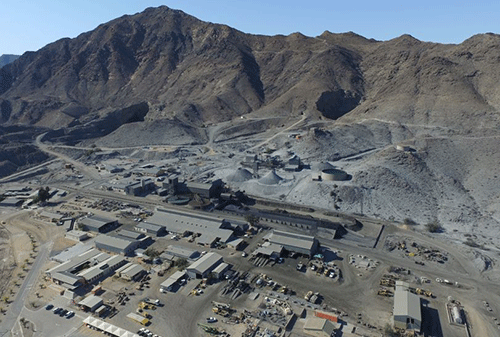ROSH PINAH – In spite of the health ministry’s report that the lead exposure at Rosh Pinah in the //Kharas region “was not a health issue”, a local doctor is alarmed at the sudden increase in cases of lead exposure.
Dr Curt Dausab of the mining town’s Sidadi Private Clinic said stakeholders should move away from confirming or denying chronic lead exposure amongst adults and children, but rather discuss solutions to mitigate the serious health threat.
“I have to date tested more than 200 possible cases of lead exposure in people’s blood levels and I am worried by the fact that most of the children normally test positive,” he told New Era at Rosh Pinah in the //Kharas region earlier this week.
The medical practitioner said the level has risen significantly from the 22 cases reported previously in a local newspaper. Dausab cautioned that since lead can be exposed in the human body through air (inhaling), ground (be in touch with lead particles) and water, all stakeholders should rather do testing in all three possible areas rather than concentrating only on one (water).
He added that children who tested positive are the ones who will suffer the most damaging effects when grown up, which will include a significant decrease in their intelligence quotient (IQ) levels at a later stage, disadvantaging their chance of becoming productive citizens in the future.
“I am sitting right now with a one-year-old baby I treated, and the toddler’s blood lead levels are starting to increase instead of decreasing,” he informed this reporter with concern.
Dausab continued that medical experts and technocrats from both the health ministry, Trevali Mining Corporation (previously known as Rosh Pinah Zinc Mine) as well as local and international private health service providers and governing bodies should meet as a matter of urgency, and work out plans how to treat and heal those affected as well as how to prevent further chronic exposures.
“The question now will be: how did the mine, operating for 54 years, not detect and report such exposures? But equally, the mine’s management may question what the public and private health sectors have done so far after discovering these infections through medical laboratories’ results,” he argued.
The medical doctor also explained chronic lead exposure in the human body, as opposed to acute exposure, as the more fatal one as it can hide in your body’s bones for 10-30 years before being discovered. In terms of chronic ones, normally appearing in adults, it can be easily detected as effects range from seizures, physical appearance, and comas.
Dausab said: “In my personal opinion, you can treat children with chronic lead exposure, but as long as they are not removed from the area where they picked it up, chances are small for recovery”.
A professional source who preferred anonymity ruled out water supplied by NamWater as the cause, saying more severe cases should have been reported of residents being exposed.
“The main source of contamination might be that the wind blows dust from the mining waste dumpsite outside town, which may contain lead particles that can be exposed especially to toddlers playing at home,” the source explained.
Mineworkers at Trevali working in the underground tunnels might thus also have inhaled lead fumes.
Like Dausab, the source said the lead-containing blood levels in humans can be reduced if affected ones are moved from areas of possible exposure. “Like alcohol, some people may not experience the same effects when exposed to different levels of lead,” the source stated. Furthermore, it is imperative that mineworkers at Trevali who might likely be exposed to lead, be constantly tested.
The health ministry has discovered that lead exposure reported in children at Rosh Pinah does not pose any health risks. Spokesperson Walter Kamanya said after an investigation was concluded, the ministry discovered that the exposure “was not a health issue’’. In the same article, Mines and Energy Minister Tom Alweendo has been reported as assuring the nation that his ministry and relevant stakeholders were engaged in a process to address concerns over lead exposure in children at the southern mining town.
Questions pertaining to the lead exposure issue sent to Trevali Mining Corporation remained unanswered at the time of going to press.
– sklukowski@nepc.com.na



